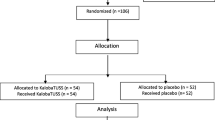Abstract
Background
Available pediatric treatments for acute cough are limited by lack of demonstrated efficacy. The objective of this trial is to compare the effects of a polysaccharide-resin-honey based cough syrup, and carbocysteine syrups on nocturnal and daytime cough associated with childhood upper respiratory tract infections (URIs).
Methods
Using a single-blind randomization design, the study recruited children from 4 general pediatric community clinics. Participants included 150 children aged 2 to 5 years with an URI, nocturnal and daytime cough and illness duration of ≤7 days. To be eligible, children had to be free of medication on the day before presentation. A survey was administered to parents on 4 consecutive days beginning from the day of presentation in clinic. Children received the study preparation on the first evening and then 3 times per day for 3 further days. Main outcome measures were cough frequency, cough severity, bothersome nature of cough, and quality of sleep for both child and parent.
Results
Both preparations were well tolerated and cough improved over the study period. After one night and on all survey days, there was a significantly better result for polysaccharide-resin-honey (P<0.05) for all the main outcome measures. The trend of improvement over the 4 days was steeper for polysaccharide-resin-honey (P<0.05) with regards to all cough parameters.
Conclusions
Both polysaccharide-resin-honey and carbocysteine cough syrups were well tolerated in children over 2 years of age. The polysaccharide-resin-honey syrup was associated with a more rapid and greater improvement in all clinical cough symptoms measured, beginning from the first night of therapy. Both nocturnal and daytime cough improved, as did sleep quality for both children and parents.
Similar content being viewed by others
References
Kesson AM. Respiratory virus infections. Paediatr Respir Rev 2007;8:240–248.
Gonzales R, Malone DC, Maselli JH, Sande MA. Excessive antibiotic use for acute respiratory infections in the United States. Clin Infect Dis 2001;33:757–762.
Fendrick AM, Monto AS, Nightengale B, Sarnes M. The economic burden of non-influenza-related viral respiratory tract infection in the United States. Arch Intern Med 2003;163:487–494.
De Blasio F, Dicpinigaitis PV, Rubin BK, De Danieli G, Lanata L, Zanasi A. An observational study on cough in children: epidemiology, impact on quality of sleep and treatment outcome. Cough 2012;8:1.
Smith SM, Schroeder K, Fahey T. Over-the-counter (OTC) medications for acute cough in children and adults in ambulatory settings. Cochrane Database Syst Rev 2012;8:CD001831.
Paul IM. Therapeutic options for acute cough due to upper respiratory infections in children. Lung 2012;190:41–44.
Paul IM, Yoder KE, Crowell KR, Shaffer ML, McMillan HS, Carlson LC, et al. Effect of dextromethorphan, diphenhydramine, and placebo on nocturnal cough and sleep quality for coughing children and their parents. Pediatrics 2004;114:e85–e90.
Yoder KE, Shaffer ML, La Tournous SJ, Paul IM. Child assessment of dextromethorphan, diphenhydramine, and placebo for nocturnal cough due to upper respiratory infection. Clin Pediatr (Phila) 2006;45:633–640.
Paul IM, Beiler J, McMonagle A, Shaffer ML, Duda L, Berlin CM. Effect of honey, dextromethorphan, and no treatment on nocturnal cough and sleep quality for coughing children and their parents. Arch Pediatr Adolesc Med 2007;161:1140–1146.
Shadkam MN, Mozaffari-Khosravi H, Mozayan MR. A comparison of the effect of honey, dextromethorphan, and diphenhydramine on nightly cough and sleep quality in children and their parents. J Altern Complement Med 2010;16:787–793.
Cohen HA, Rozen J, Kristal H, Laks Y, Berkovitch M, Uziel Y, et al. Effect of honey on nocturnal cough and sleep quality: a double-blind, randomized, placebo-controlled study. Pediatrics 2012;130:465–471.
Canciani M, Murgia V, Caimmi D, Anapurapu S, Licari A, Marseglia GL. Efficacy of Grintuss® pediatric syrup in treating cough in children: a randomized, multicenter, double-blind, placebo-controlled clinical study. Ital J Pediatr 2014;40:56.
Mallet P, Mourdi N, Dubus JC, Bavoux F, Boyer-Gervoise MJ, Jean-Pastor MJ, et al. Respiratory paradoxical adverse drug reactions associated with acetylcysteine and carbocysteine systemic use in paediatric patients: a national survey. PloS One 2011;6:e22792.
Chalumeau M, Duijvestijn YC. Acetylcysteine and carbocysteine for acute upper and lower respiratory tract infections in paediatric patients without chronic-pulmonary disease. Cochrane Database Syst Rev 2013;5:CD003124.
Footitt J, Johnston SL. Cough and viruses in airway disease: mechanisms. Pulm Pharmacol Ther 2009;22:108–113.
Dicpinigaitis PV. Effect of viral upper respiratory tract infection on cough reflex sensitivity. J Thorac Dis 2014;6:S708–S711.
Morice AH. The cough hypersensitivity syndrome: a novel paradigm for understanding cough. Lung 2010;188:S87–S90.
Morice AH, McGarvey LP, Dicpinigaitis PV. Cough hypersensitivity syndrome is an important clinical concept: a pro/con debate. Lung 2012;190:3–9.
Davenport PW. Urge-to-cough: what can it teach us about cough? Lung 2008;186:S107–S111.
Dicpinigaitis PV, Bhat R, Rhoton WA, Tibb AS, Negassa A. Effect of viral upper respiratory tract infection on the urge-tocough sensation. Respir Med 2011;105:615–618.
Wegener T, Kraft K. Plantain (Plantago lanceolata L.): antiinflammatory action in upper respiratory tract infections. Wien Med Wochenschr 1999;149:211–216.[In German]
Franz G. Polysaccharides in pharmacy: current applications and future concepts. Planta Med 1989;55:493–497.
Nosalova G, Fleskova D, Jurecek L, Sadlonova V, Ray B. Herbal polysaccharides and cough reflex. Respir Physiol Neurobiol 2013;187:47–51.
Israili ZH. Antimicrobial properties of honey. Am J Ther 2014;21:304–323.
White JW. Composition of honey. In: Crabe E, eds. Honey: A comprehensive survey. New York, NY: Crane, Russak Company, 1975: 157–206.
Gheldof N, Engeseth NJ. Antioxidant capacity of honeys from various floral sources based on the determination of oxygen radical absorbance capacity and inhibition of in vitro lipoprotein oxidation in human serum samples. J Agric Food Chem 2002;50:3050–3055.
Oduwole O, Meremikwu MM, Oyo-Ita A, Udoh EE. Cochrane in context: Honey for acute cough in children. Evid Based Child Health 2014;9:401–444.
Warren MD, Pont SJ, Barkin SL, Callahan ST, Caples TL, Carroll KN, et al. The effect of honey on nocturnal cough and sleep quality for children and their parents. Arch Pediatr Adolesc Med 2007;161:1149–1153.
Author information
Authors and Affiliations
Corresponding author
Rights and permissions
About this article
Cite this article
Cohen, H.A., Hoshen, M., Gur, S. et al. Efficacy and tolerability of a polysaccharide-resin-honey based cough syrup as compared to carbocysteine syrup for children with colds: a randomized, single-blinded, multicenter study. World J Pediatr 13, 27–33 (2017). https://doi.org/10.1007/s12519-016-0048-4
Received:
Accepted:
Published:
Issue Date:
DOI: https://doi.org/10.1007/s12519-016-0048-4




